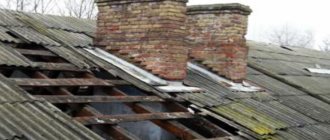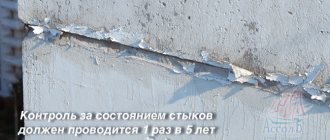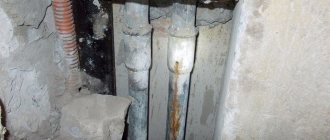The smell of sewage in the entrance is a common occurrence in multi-storey buildings. The stench fills every stairwell. The result of decomposition in the basement emits aromas comparable to vinegar or reminiscent of the stench of a corpse.
When plumbers cannot solve this problem, residents do not know where to turn for this issue.
The smell of sewage not only affects the nasal receptors, but can also be harmful to health. The cadaverous stench in the entrance hall causes dizziness and nausea in weak, weakened people.
For those who live on the first floors, vinegar impurities interfere with healthy sleep. Inaction of the management campaign causes complications to develop.
Who is responsible for sanitary conditions in a residential building?
The management company is responsible for the condition of the sewerage system, which has undertaken obligations to maintain the house and signed an agreement with the residents. Management company employees eliminate the smell in the entrance upon request.
If periodic repetitions of the stench are observed, then the situation may be considered a violation of the performance of duties. And this is followed by punishment of the guilty persons.
The second authority after the management campaign is the housing inspection. An application to this organization will force leaders to respond with the right measures.
To hold violators accountable, it is recommended to record each request on paper, including points of refusal. The latter may appear due to tenants violating the terms of use of sewerage systems.
If the rules of use are violated, the water supply and sewerage may become clogged. But the smell of vinegar or the stench of corpses should not appear in your entrance.
More often than not, clogs lead to stinking well systems. In this case, a column about improper organization of communications in the basement will appear in the inspection findings.
The following persons are responsible for the condition of the residential building:
- Management campaign employees;
- The residents of the apartment building themselves.
Where to go for help?
According to the law, the management company or other organization servicing the house is responsible for the condition of the basement.
These structures should be contacted if an odor is detected in the basement. Workers are required to quickly respond to the call, eliminate the cause of the breakthrough, clean the premises, and do not forget to replace leaking pipes.
Also, at the end of the work, disinfection after a breakthrough.
- The first step is to contact the company responsible for the home. At first you can just call, even several times. If there is no response, you should go personally to the reception office of the Criminal Code or Housing Office and write a complaint. A sample complaint document must be provided on site. Complaints must be registered; this may be useful in court proceedings due to a leak in the basement. You can also send your appeal by mail, registered mail with registration.
- A written complaint usually elicits a quick response. A team of craftsmen arrives on site to eliminate the odor and the cause of its occurrence.
- If employees of the housing and communal services or management company refuse to solve the problem, you need to go further - to the housing inspectorate or any other city regulatory body.
- A universal option that can be used if the management company is passive is Rospotrebnadzor . This organization also accepts written complaints and registers them.
ATTENTION! Lawyers recommend filing an individual complaint; it will be considered faster. Collective appeals require longer consideration.
A written appeal regarding problems with sewerage must be written in business language , accurately indicating all the facts. The address, time of occurrence of the stench, and other data are indicated.
The complaint indicates where the appeal has already been sent and which company has not responded to the information.
Causes of stench
The constant smell of vinegar in your entrance indicates the following factors:
- Lack of sealing of the sewer system. The pipeline needs to be replaced, and the management company is avoiding the costly procedure;
- The cadaverous stench appears due to the death of cats in basements; employees of the management company are also required to remove the remains of animals;
- Plumbing measures lead to the fact that when the sewer overflows and becomes clogged, waste begins to fill the floors of the basement. This condition repeats periodically. Workers only clean the water supply, forgetting about completely cleaning the floors and disinfecting them;
- Storing prohibited items is a common cause of dangerous odors in the entrance. In such cases, attracting violators is as easy as shelling pears;
- The absence of bars on basement windows leads to the appearance of uninvited inhabitants. Most often, cats and rats become like this. Animal feces gradually accumulate, giving off a stench.
What actions are reasonable?
If the sewer smell is not strong, then the duration of the analysis is not so deplorable. Complications arise when the stench is absolute, when the residents’ patience is running out.
In such cases, it is necessary to use all available measures of influence on violators of the contract for the maintenance of a multi-storey building. Now people have the opportunity to change the management campaign at any time.
Organizing and holding a meeting is often quite difficult. Therefore, residents choose other ways to influence violators:
- Complaints in written and oral form to all authorities;
- Threats to the managers of the management company to terminate the contract;
- Involvement of supervisory authorities;
- Call emergency services as soon as possible;
- Organizing an inspection of the basement by the sanitary and epidemiological service;
- Assessment of the condition of pipelines and sewerage by third-party plumbing specialists. Receiving a conclusion in written certified form;
- Your own efforts are to analyze the current situation, looking into the basement with a camera and providing reliable information to the management company.
The right steps to get rid of an unpleasant “aroma”
Let's consider where you can contact.
Sequence of actions when a sewer smell appears:
- Management company - better in writing, making a copy with the date the application was written. If the smell in the entrance has not disappeared, then you can contact the leaders of the organization;
- It is not recommended to delay receiving a response; you can give no more than 5 days for consideration. At the request of residents, a commission should be organized to examine the reason for the smell from the sewer;
- The Housing Inspectorate is an organization that people turn to in case of gross violations of the contract by management companies. To confirm information about the odor, all available evidence is used: an independent examination report, documents from the sanitary and epidemiological service, statements from apartment owners;
- The courts are the last method of bringing violators to justice. In this case, the smell in the entrance will bother the residents for a long time, since the review period will take weeks, or even months;
- The prosecutor's office will help with a correctly drawn up application from residents. Otherwise, employees of the government agency will report a lack of authority.
Reasons why the entrance may smell like sewer
First, determine where the sewer smell is. If it is in the entrance and in apartments located on the first floors, then most likely the reasons for the sewer smell in the entrance lie in the pipes. They can be damaged and, as a result, water can leak out, which creates an odor. A simple clogged pipe or the death of a pet in the basement can also be the cause of this situation.
IMPORTANT! You should not hesitate in such a situation. First you need to determine the cause of the unpleasant odor. If residents have access to the basement, you can initially try to determine it.
Leaking pipes can lead to erosion of supporting structures and lead to destruction. You need to act as soon as possible.
What not to do?
Not recommended:
- Draw up collective documents for appeal to government agencies. Each application is written by the apartment owners;
- Wait for a response and hope for the honesty of the verbal promises of the HOA leaders;
- Involve third parties to fix the pipeline. This prerogative will not be compensated by the management campaign;
- Scandals and threats will lead nowhere. All actions must be documented. Sample applications are drawn up in two copies. The signature of the person accepting the paper with the date of application is placed on the applicant’s sample.
Documents are drawn up in a strictly prescribed form, with signatures and full information about the owner and the HOA.
What other reasons are there for the appearance of stench from the basement?
An unpleasant odor is often caused by moisture accumulation in the basement. This occurs due to its penetration through the floors of the room from the ground.
Melt water can pass through an improperly treated foundation. Correcting this situation will cost the residents of the house a pretty penny. The management company is not responsible. Claims will have to be submitted to the developer of the house.
If there is a slight accumulation of moisture in the basements, it should evaporate naturally. But the previous owners could have made changes to the basement ventilation system. Management companies are required to restore air flow in consultation with residents.
Material costs will fall on the shoulders of the owners. Worn-out sewer systems require major repairs, the date of which can be checked on the Internet. This applies more to aging homes.
What laws and regulations should you follow?
And so let's start with the fact that, based on Article 161 of the Housing Code of the Russian Federation, the management of an apartment building must provide safe and favorable living conditions for citizens; only proper maintenance of an apartment building can ensure these conditions.
Where can I complain about the management company if it doesn’t fulfill its duties?
Based on Article 162 of the Housing Code of the Russian Federation, an agreement for the management of an apartment building is concluded between the parties. One party is the residents (owners of residential premises in an apartment building) and the second party, the management organization, enter into an agreement on the basis of which the management organization, for a fee, is obliged to perform work and provide services for the proper maintenance of common property in an apartment building (MCD), and the management organization is also obliged to provide utilities to owners of premises in apartment buildings (water, heating, electricity and other services), as well as other activities aimed at achieving the goals of management of apartment buildings.
Based on paragraphs. “a”, paragraph 2 of the Decree of the Government of the Russian Federation of August 13, 2006 N 491, common property includes technical basements.
That is, you now know where to refer if you have a dispute with your management organization.
Next, you need to know about the Decree of the State Construction Committee of the Russian Federation dated September 27, 2003 N 170 and about paragraph 3.4 of this resolution, according to which the management organization is obliged to ensure temperature and humidity conditions in the basements and technical undergrounds of apartment buildings, which will prevent the formation of condensation on the surfaces of enclosing structures , cleanliness in the basements, as well as accessibility to all elements and utilities located in the basement, as well as proper maintenance and maintenance of basements includes protection against entry into the basements of rodents, cats and dogs. Basements must not only be ventilated throughout the year on a regular basis, but they must also maintain temperature and humidity conditions in accordance with established requirements. If condensation does form in the basement or mold appears, the management organization is obliged to first eliminate the source of moisture, organize a ventilation system for the basement, and carry out mold treatment. All this work should not be paid additionally; all this is already included in the payment for housing maintenance.
We will also return to the Decree of the Government of the Russian Federation of August 13, 2006 N 491, namely to paragraph 10 of this resolution, which says that common property must be maintained in accordance with the requirements of the legislation of the Russian Federation, in a state that ensures compliance with the reliability and safety characteristics of apartment buildings, including common property must be maintained in accordance with the legislation on the sanitary and epidemiological welfare of the population, technical regulation and legislation on the protection of consumer rights. Also, common property must be maintained in such a way that it ensures safety for the life and health of residents and owners of apartments in apartment buildings, as well as the safety of the property of legal entities. The constant readiness of utilities, metering devices and other equipment that is part of the common property must be ensured, through which the supply of utility resources to the owners of apartments in the apartment building is ensured.
Based on the above, the management organization, regardless of the form of management of the house, has all the necessary resources and means to maintain the common property in proper condition.
Also, on the basis of paragraph 42 of the Decree of the Government of the Russian Federation of August 13, 2006 N 491, the management organization, as well as other organizations and persons performing work and providing services under the direct management of apartment buildings, are responsible to the owners of residential premises for improper fulfillment of their obligations and bear material , administrative, as well as criminal liability for improper fulfillment of their obligations to manage apartment buildings.
How to force the management organization to eliminate the unpleasant smell from the basement?
There is one interesting point here and the management organization is cunning, you may be misled, because in fact, by law, the list of works that relate to routine repairs and maintenance of common property is not established or delimited, that is, you may thereby be misled and told, that the Criminal Code is not responsible for anything and you yourself must fight this smell.
Don’t believe it, this is pure fiction and a lie, because the Presidium of the Supreme Arbitration Court of the Russian Federation, in its Resolution No. 6464/10 of September 29, 2010, made it clear to all management organizations that such excuses will not work and I will further explain why.
This resolution clarified that the services provided for in Article 162 of the Housing Code of the Russian Federation are provided in addition to those services that already normally ensure compliance with regulatory requirements for the maintenance and operation of an apartment building (MAD).
This means only one thing, that all urgent or current, as well as mandatory, seasonal work and services, are already considered provided for in the management agreement for an apartment building due to the norms for the maintenance of an apartment building as an object, and management companies must perform the entire list of works and services for maintaining the house, regardless of whether specific services are mentioned in the apartment management agreement concluded between residents and the management organization or not.








